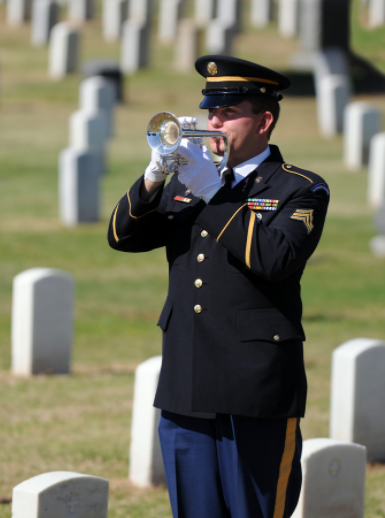"It was awful," says Gary's wife, Joanie Marquardt, with a laugh.
“有点害怕,”加里的妻子琼妮·马夸特笑着说。
The Marquardts' neighbors, Bruce and Carol Hedblom, were exposed to Gary's playing too. "No inhibitions," Bruce says diplomatically.
马夸特家的邻居布鲁斯和卡罗尔·赫德布卢姆也看到了加里的表演。“没有禁忌,”布鲁斯说道。
"I would have given up," adds Carol. Instead, Gary took lessons. "We were all hoping he would get better," says Joanie.
“我本应该放弃的,”卡罗尔补充道。相反,加里学道了知识。“我们都希望他能变得更好,”琼妮说。
"And then he did." He even passed his audition (on the third try).
“后来他做到了。”他甚至通过了试镜(第三次试镜)。
Through BAA, Gary volunteers at funerals roughly a hundred times a year. "I don't play perfect every time," he says.
通过全美军号组织,加里每年大约做100次葬礼志愿者。“我不是每次都吹得很完美,”他说。

"But it comes from the heart." When he's not playing a funeral, he's often found at local cemeteries honoring veterans.
“但我是发自内心的。”当不参加葬礼时,他会经常去当地的公墓,纪念退伍军人。
Be they Civil War–era soldiers or casualties of more recent conflicts,
无论是参加内战的士兵还是最近在冲突中的伤亡人士,
he always leaves a penny on each stone, symbolizing the pittance of his service compared with theirs.
他总是在每一块石头上留下一便士,象征着自己的服务与他们相比微不足道。
But why so committed? Turns out Gary—now 68 and comfortably retired after selling his document services company—got a pass in his 20s.
但为什么这么承诺?事实证明,出售文件服务公司后轻松退休的68岁的加里,在20多岁时获得了通行证。
He was all but certain he'd be heading to -Vietnam after college, until a bleeding ulcer intervened.
他大学毕业后去越南几乎成为定局,直至被诊断为胃出血。


